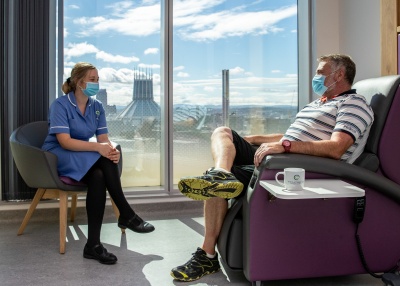
Different types of drugs are used to treat cancer. They do this in different ways.
Systemic anti-cancer therapy (SACT) is a term used to describe the different drug therapies for cancer. These include:
- Chemotherapy – which aims to kill cancer cells
- Hormone therapy (endocrine therapy) – which aims to block or reduce the hormones that cause some cancer cells to grow
- Immunotherapy – which aims to train your immune system to attack cancer
- Targeted therapies – which aim to target the DNA and cell changes that cause cancer
This page explains what to expect during your treatment with us.
Video guides: What to expect when you come for your treatment
What to expect when you come for treatment: Clatterbridge Cancer Centre - Liverpool
What to expect when you come for treatment: Delamere Unit, Clatterbridge Cancer Centre - Wirral
What to expect when you come for treatment: Marina Dalglish Centre, Aintree
What to expect when you come for treatment: CANtreat, Halton
Different types of cancer treatment - what they are and how they work
Our team and locations
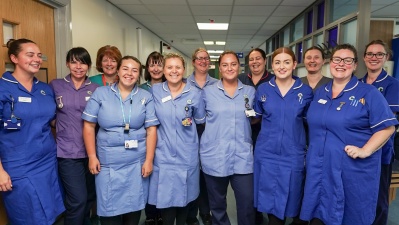
Our Chemotherapy and SACT nurses are highly-qualified and have had specialist training in cancer drug treatments. They will be there for you every step of the way.
We have comfortable treatment chairs and beds. We also offer free tea, coffee and light refreshments. Parking is free at all our treatment locations.
Divisional Nurse Director for Networked Services
Carla Taylor
Matron
Claire Bennett
Ward managers
Clatterbridge Cancer Centre – Liverpool
Rachael Gregory
Clatterbridge Cancer Centre – Wirral
Sarah Mullis
Aintree University Hospital: Marina Dalglish Centre
Joanne Fisher
Halton Hospital: CanTreat
Laura Selby
We have treatment clinics in hospitals across Cheshire and Merseyside. Wherever possible, we will offer you treatment in the location that is most convenient for you.
We also offer treatment at home and in the workplace for people on some cancer treatments.
Some more specialist treatments – including treatment for rare cancers – are only available in our main hospital(s).
Read more about our treatment locations and how to get there:
Deciding to have treatment
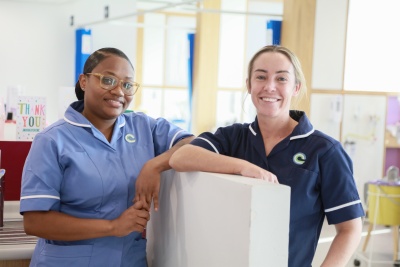
Your doctor will discuss this with you during your appointment so you can decide what treatment is right for you. You can bring someone with you to this appointment (e.g. a family member, carer or friend) if you like. You can ask any questions you have about your treatment options. You can also talk about any worries you have.
When you are ready, your doctor will ask you to give your consent for treatment. Giving your consent confirms you are agreeing to have treatment. You do not have to give consent if you decide you do not want the treatment.
Before your first treatment, you will have a pre-assessment appointment with a specialist cancer nurse. We also now offer group pre-assessment sessions. (Read more about our group pre-assessment sessions.)
At your pre-assessment, you will have blood tests. You might also have some other tests, depending on your treatment. We will also measure your height and weight so we know how much treatment to give you (the dose).
Your nurse will explain more about your treatment and about what to expect. You can ask any questions you have and talk about anything that is worrying you.
Your nurse will also tell you about your treatment appointments including how often your treatments will be.
Central and PICC lines
If your treatment needs to be given into your veins via a drip or a needle, you might have a line inserted to make this more comfortable. The line is a tube that stays in your body for as long as it is needed. It means you don’t need to have a needle inserted every time you have treatment – the treatment is given directly into the line.
Our Clinical Interventions team will insert the line for you at an appointment before you begin treatment. This will usually take place in Level 1 at The Clatterbridge Cancer Centre – Liverpool.
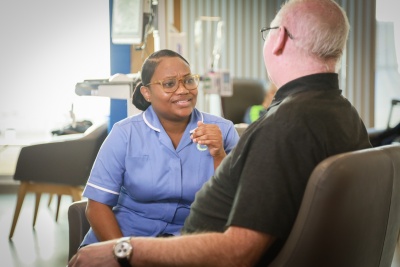
We know you might feel nervous about starting cancer treatment. Our specialist nurses will do all they can to make it as easy and comfortable as possible for you. They will be there for you every step of the way.
You can ask them any questions you have and talk about anything that is worrying you. They can also help if you have any side-effects or feel unwell from your treatment.
What to bring with you
You might like to bring something with you to help pass the time more comfortably:
- Something to read
- A phone or device for listening to music, watching TV or films, playing games and so on. We have free WiFi. Please wear headphones as a courtesy to others
- Your own drinks or snacks if you prefer them to the ones we provide
Find out about bringing someone with you when you come for treatment.
When you arrive
You will need to check in to reception to let us know you have arrived. Tell the receptionist you are there and they will explain where to wait for your appointment. In some locations, you can check in by using a self-check-in machine that will tell you where to wait for your appointment.
Your nurse will collect you from the waiting area. They will ask you some questions to check you are able to have treatment. They will also check your height and weight again.
Visitors and chaperones
You can usually bring someone with you to your treatment if you wish. For safety and comfort, we just ask you to follow these rules:
- One adult visitor or chaperone can come with you
- Children are not allowed – it is not a safe or suitable environment for children
- Follow any local restrictions on visiting. (For example, sometimes visitors might not be allowed due to the risk of infection.)
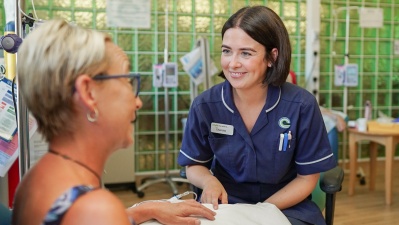
- Drip – where treatment in a bag is given through a tube into your body, usually into your arm. Sometimes this can take several hours
- Injection – where the treatment is injected straight into your body
- Oral – as a tablet or capsule that you put into your mouth and swallow (oral chemotherapy)
- Directly – some treatments can be inserted into the body or put on the skin
You might have a range of different cancer drugs during your treatment. This might change how and where you have treatment – for example, you might have drip treatment at first and then change to oral chemotherapy.
Your doctors and nursing team will explain any changes in your treatment so you know what to expect.
Treatment times
Some treatments are very quick. If your treatment is oral or by an injection, your appointment will be booked into one of our rapid chairs – these are normally 30-minute appointments.
Most drip treatments need to be given more slowly. Sometimes this can take several hours or most of the day depending on what treatment you are having.
Facilities and comfort
We want you to feel relaxed and comfortable during your treatment. All our treatment locations offer:
- Comfortable treatment chairs
- Free WiFi
- Free tea, coffee and light refreshments – we also offer sandwiches if you are having a long treatment over lunch
- Free parking – ask your nursing team about this
Please use headphones as a courtesy to others if you are listening to something on your phone or device (e.g. music, TV, film, games, video call).
Our treatment team and volunteers are there for anything you need.
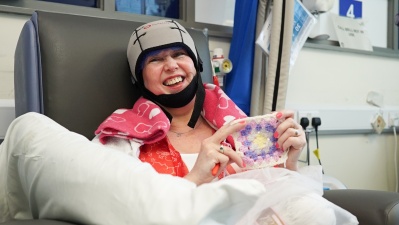
Hair loss can be a side-effect of some cancer treatments. Scalp cooling can help reduce this hair loss.
If you are on certain cancer drugs, we might ask if you would like to wear a cool cap (also known as a cold cap) during your treatment. The cap cools the scalp while your chemotherapy is being delivered. This can help to reduce hair loss. However it can feel unpleasant and it does not work for everyone.
If you are using a cool cap you might like to bring:
• Your own conditioner for your hair
• A blanket
• A hot water bottle
• Towels
Find out what to expect if you use a cool cap:
We can also advise you on wigs and scarves and other support for hair loss – ask your nursing team about this.
Treatment side-effects and complications
Cancer drugs can cause side-effects or other health issues. Your clinical team can help with this. Tell them about any side-effects or complications you develop. Many of these side-effects are mild and can be treated with over-the-counter medicines from your local pharmacy.
But some of these side-effects and complications can be very serious.
Call our Hotline straight away if:
- You have a temperature over 37.5°C (99.5°F)
- You suddenly feel unwell, even with a normal temperature
- You have symptoms of an infection – these include feeling shivery and shaking; a sore throat; a cough; breathlessness; diarrhoea; needing to pee frequently or feeling pain or discomfort when you pee
- Your temperature goes below 36°C (96.8°F)
Our Hotline nurses can assess your symptoms and offer expert advice on what to do next.
Call 999 or go to A&E straight away if you have:
- Chest pain
- Severe breathing difficulties
- Severe confusion or unconscious
- Moderate or severe bleeding
- Symptoms of a stroke
- Other serious life-threatening emergencies
Find out about urgent cancer care and our Hotline and Clinical Decisions Unit .
There is lots of useful information about side-effects and complications on the Macmillan Cancer Care website.
We have included information about some common side-effects and complications below.
Chemotherapy side-effects
Chemotherapy can cause side-effects. Common side-effects include:
- Feeling sick (nausea) or vomiting
- Bowel issues
- Mouth ulcers
- Changes to the feeling in your fingers or toes (‘peripheral neuropathy’)
- Reduced immunity
We will tell you about side-effects linked to any cancer drugs you are on. We will also give you written information about this.
Immunotherapy side-effects
Immunotherapy helps your immune system to recognise and attack cancer cells. Sometimes the immune system reacts too strongly to immunotherapy, causing side-effects. These side-effects are different from those we see with chemotherapy.
The most common side-effect from immunotherapy is inflammation as your immune system responds to the treatment. When this happens, the immune system can attack normal cells causing inflammation and a change in how the cell works. This can cause many conditions – for example, arthritis, colitis, dermatitis and hepatitis.
Steroids are used to treat immunotherapy side-effects.
We will tell you about side-effects linked to any cancer drugs you are on. We will also give you written information about this.
Hormone (endocrine) therapy side-effects
Hormone (endocrine) therapy can cause menopausal side-effects including hot flushes, aching joints and brain fog. This usually improves within 3 months. If it does not, we can offer help with the side-effects or change your treatment if needed.
Bisphosphonate side-effects
Some people have bisphosphonates – drugs that can help to strengthen bones and reduce the risk of them breaking – as part of their cancer treatment.
Bisphosphonates can cause flu-like symptoms for about 72 hours afterwards.
Very rarely, bisphosphonates cause a condition called osteonecrosis of the jaw where bone cells in the jaw die. If you are on bisphosphonates, we will tell you to let us know if you have any jaw pain. We also advise you to have a dental check-up every six months.
If you need invasive dental treatment including an extraction (removal of a tooth) or root canal treatment, you will need to stop taking bisphosphonates for six weeks before your dental treatment and six weeks afterwards. This helps the bones in your jaw to recover.
Common side-effects and complications
Infections
Cancer drugs can affect the immune system and make your body less able to fight infections. You will have regular blood tests during your treatment so we can check how your immune system is doing.
Your nursing team will explain how to reduce your risk of getting infections. They will also tell you what symptoms to watch out for and when to contact us for help.
Hair loss – cool caps
Some cancer drugs can cause hair loss. This can be difficult to cope with. Your clinical team will explain your options and can offer advice and support including:
- Cool cap (scalp cooling) – we might ask if you would like to wear a cool cap if your treatment is suitable for this. This cools the scalp while your chemotherapy is being delivered. It can help to reduce hair loss but it can feel unpleasant and it does not work for everyone
- Wigs – we can tell you about wig vouchers and local wig providers
- Scarves
Tummy problems (nausea, vomiting, diarrhoea, constipation)
People sometimes feel sick (nausea) or get sick (vomiting). You might have runny or watery poo (diarrhoea) or find it harder to poo than usual (constipation). Tell your nursing team if you have these symptoms.
If you are feeling very unwell with these symptoms, call our Hotline team on 0800 169 5555.
Appetite and mouth problems
You might feel less hungry than usual. Some people find their tastes change and they don’t like the same food as usual.
Sometimes people get a sore mouth, mouth ulcers or find their mouth is very dry.
Your nursing team can give you advice about these symptoms. You might also find this advice from our dietitians helpful. If your symptoms are serious, we might refer you to our dietitians.
Skin and nail problems
Cancer drugs can affect the skin and nails. Tell your nursing team if this happens to you. They can give you advice that might help.
Numb, tingling or painful hands or feet (peripheral neuropathy)
Cancer drugs can affect the nerves in your hands and feet. Your fingers or toes might feel numb, tingling or painful. You might feel like you have ‘pins and needles’. Tell your nursing team if this happens to you.